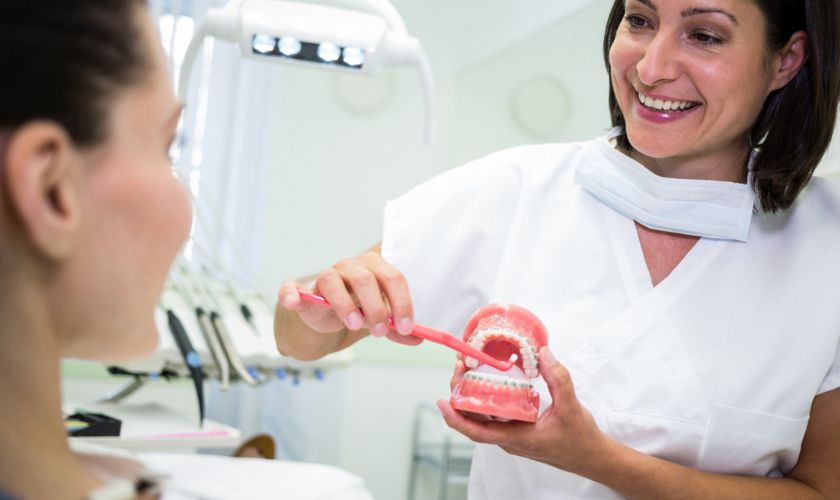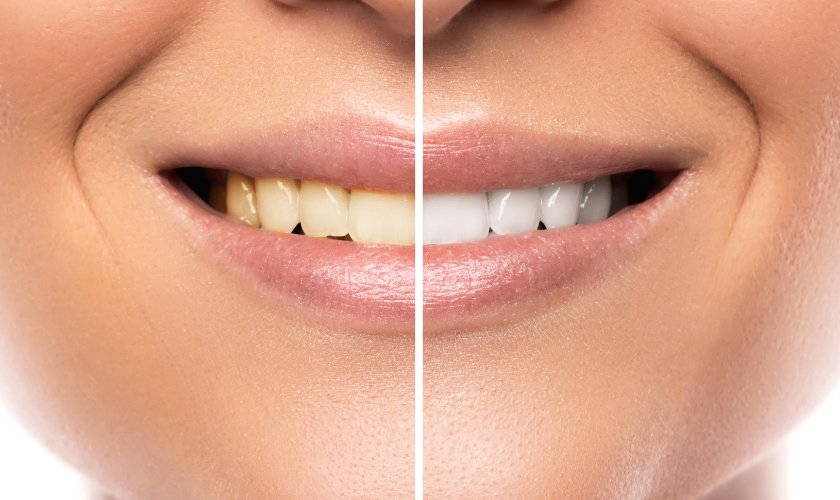
Getting new dentures can be a transformative experience, bringing back the ability to eat confidently and smile brightly. However, there’s an adjustment period, and sometimes, the new one might not feel perfect at first. This is normal, but it’s crucial to address any discomfort or ill-fitting issues to ensure a smooth transition and optimal oral health.
Why Do New Dentures Feel Uncomfortable?
There are multiple factors which can contribute to new dentures not fitting perfectly:
- Natural gum changes: After tooth extraction, your gums and jawbone naturally shrink and get reshaped over time. This natural process can cause your dentures to feel loose or unstable.
- Minor adjustments needed: Even with careful planning and fitting process, the new one might require minor adjustments to have comfortable fitting and stability. These adjustments may involve refining specific areas or adding cushioning material.
- Swollen gums: Following extractions, your gums remain inflate and sensitive for some time. If dentures are implanted during this time, this may temporarily create discomfort to your denture settings.
Signs Your New Dentures Might Need Attention
While some initial awkwardness is expected, here are some signs that might indicate your new dentures not fitting right and require professional attention:
- Slipping or clicking: Your dentures should feel secure and stay in place when you talk, eat, or smile. If they slip, click, or rub against your gums, it is a sign that they might not be fitting correctly.
- Pain or irritation: New implants should not cause any pain or discomfort to your gums or tongue. If you experience any soreness, irritation, or pain in your gum, it’s important to see your dentist to identify the cause and find a solution.
- Difficulty chewing: If your dentist properly fits dentures, it should allow you to chew comfortably and effectively. If you find yourself struggling to chew certain foods or experience discomfort while chewing, you might need adjustments.
- Speech problems: Ill-fitting can sometimes affect your speech, making it difficult to pronounce certain sounds clearly. This can be a frustrating issue, and it’s essential to address it for clear communication.
What Can I Do to Make My Dentures Fit Better?
- Schedule a follow-up appointment with your dentist: This is crucial to ensure optimal comfort and functioning of your new dentures. If you are located in reno, book an appointment with your dentist who can assess the fit, identify any pressure points or areas that need adjustment, and make the necessary modifications.
- Use denture adhesive as directed by your dentist: While not a permanent solution, denture adhesive can help improve the temporary fit and stability, especially during the initial adjustment period when your mouth is still getting used to them.
- Be patient and allow your mouth to heal: After tooth extraction, your gums and jawbone need time to recover and adjust to the new dentures. The healing process of your gums can take several weeks or even months. Have patience and allow gums sufficient time to heal and adapt.
- Practice good oral hygiene: This includes brushing regularly and cleaning your mouth thoroughly to prevent infections and maintain good oral health.
Can New Dentures Be Reshaped?
Yes, in some cases, your dentist can reshape your new dentures if not fitting right. However, it’s important to understand that this is not always an option, and the extent of reshaping possible depends on the material and design of your dentures. Here’s a breakdown of what to expect:
- Minor adjustments: If the issue involves slight pressure points or minor fit discrepancies, your dentist can often reshape specific areas using specialized tools and techniques.
- Limitations: Extensive reshaping, especially involving large sections of the denture, might not be feasible. In such cases, your dentist might recommend a complete remake of the dentures to ensure optimal fit and function.
Can I Adjust My Dentures Myself?
It is important to note that attempting to reshape your dentures, by yourself is not always recommended Here’s why:
- Risk of damage: Dentures are delicate and require specialized tools and expertise to adjust safely. Attempting to adjust them yourself could result in permanent damage, such as cracks, chips, or warped material. This damage can render them unusable and necessitate the need for new once.
- Worsening the fit: Even if you manage to make some adjustments without causing physical damage, there is a high chance that you will end up worsening the fit. This is because modifying them requires a deep understanding of their makings and how changes in one area can affect the overall fit and stability. Attempting DIY adjustments can lead to uneven pressure distribution, causing further discomfort and potential damage to your gums and jawbone.
- Increased risk of infection: Improperly adjusted once can create gaps or areas where food particles can easily get trapped. This can create a breeding ground for bacteria, increasing the risk of developing oral infections like thrush or denture stomatitis.
If you’re experiencing any issues, remember that your dentist is your best resource. They have the expertise and necessary tools to assess the situation, make appropriate adjustments, and ensure your dentures fit comfortably and function optimally.
By following these tips and seeking professional help when needed, you can have a smooth implantation and enjoy the benefits of a confident and healthy smile.
New Patients & Emergency Appointments Welcome!





